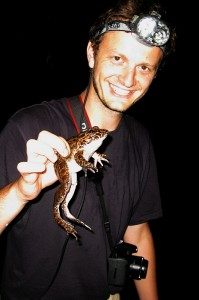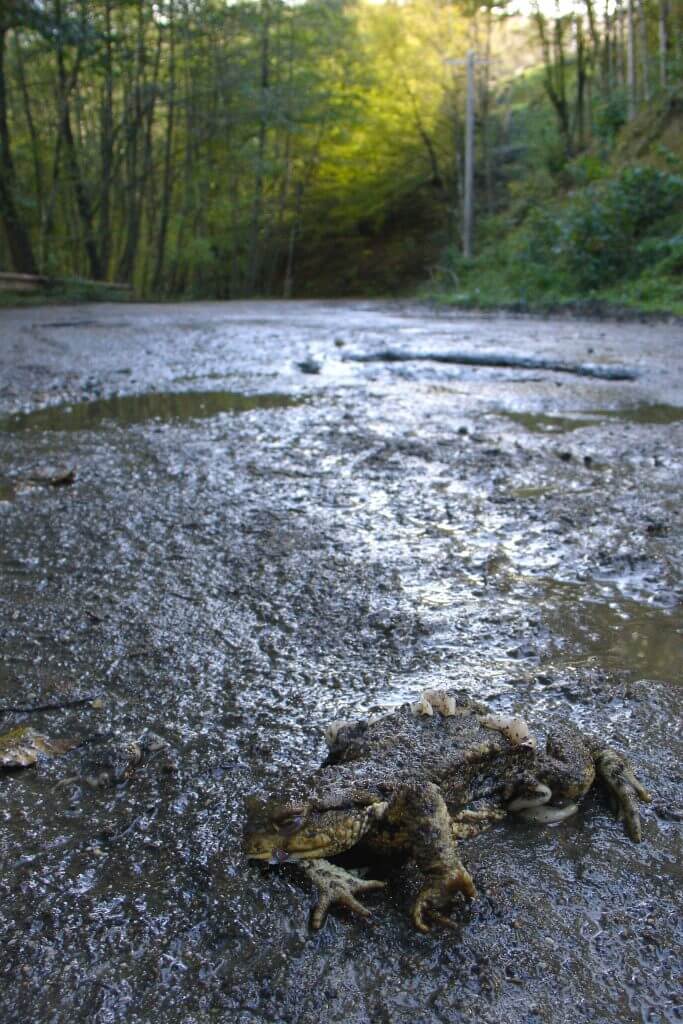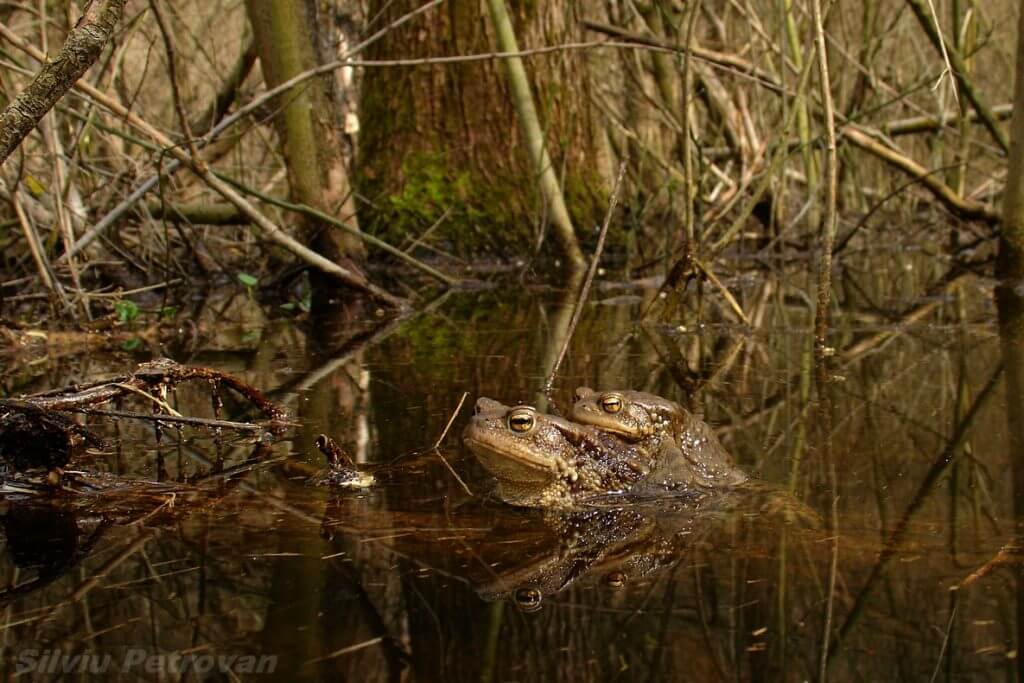 Silviu joined Froglife in 2011 to take up the new post of Conservation Coordinator. Despite recently working on mammals for a number of years Silviu has always been interested in reptiles and amphibians and has worked as a herpetologist on several research projects, primarily in Romania, Honduras and Indonesia. He is a fully qualified vet and holds an MSc in Taxonomy and Biodiversity Conservation from the University of Bucharest.
Silviu joined Froglife in 2011 to take up the new post of Conservation Coordinator. Despite recently working on mammals for a number of years Silviu has always been interested in reptiles and amphibians and has worked as a herpetologist on several research projects, primarily in Romania, Honduras and Indonesia. He is a fully qualified vet and holds an MSc in Taxonomy and Biodiversity Conservation from the University of Bucharest.
I think it’s fair to say it has not, so far, been a good month for British wildlife.
On the 6th of October we put out a press release for our mammoth toad paper, a collaboration between Froglife and Benedikt Schmidt from Zurich University, detailing a combined 70 years of data collected by thousands of toad patrol volunteers in the UK and Switzerland. The depressing headlines with 68% declines of toads in the UK have been widely reported and, on a positive side, attracted a lot of attention to a topic that gets very little interest: the status of common and widespread species, particularly amphibians. The full paper is available on the open access journal PLOSONE.
Why exactly hundreds of thousands of toads have vanished from our countryside remains unknown but the fact that this affected such huge numbers of populations (153 populations in the UK alone) and in almost all regions, indicates this as a reflection of large-scale and prolonged deterioration of conditions in the countryside since the mid-1980s. Perhaps even more worryingly is that the declines seem to be ongoing with no sign of abatement except for Wales and Cornwall where the last decade seems to have brought some respite, again for mysterious reasons.
Days after our toad paper release, Butterfly Conservation reported the worst ever year for butterflies, again for reasons unknown but potentially linked to climate change.
And then last week, on the back of this all, plus the depressing recent figures from the new State of Nature report, finally there has been a political response. Yet, this was not to ask for urgent implementation of additional protection measures for our wildlife and for a combined revision of agri-environment schemes and of the planning system that would address the obvious large-scale issues of countryside deterioration and prolonged declines of some of our most widespread and adaptable species. Rather, in the House of Lords, Lord Borwick, the Fifth Baron Borwick and a director of two building firms, named great crested newts, a legally protected and declining species, an “awful amphibian” and a “benighted reptile” and asked for legal protection to be removed following the British vote to exit the EU. This was followed by a claim that public members have introduced great crested newts on sites proposed for development, a claim rapidly accepted by the wider media, despite the fact that it is based on nothing more than hearsay.
If this is the fate the politicians have in mind for our strictly protected species what hope is there for the “common” toad, even in the face of two-third declines in the past 30 years? Toads currently receive no protection in terms of planning decisions and their conservation, just like for common butterflies, requires much more than dots on the map, where small reserves can be managed for their benefit.
What we need is a joined-up effort to put in place large scale habitat improvements, especially in farmland and linked with any new system of agricultural subsidies. This should go hand in hand with the strategic creation of networks of high-quality habitat patches containing some of our most precious biodiversity resources, namely ponds. This is what we will be working towards for the (not so common) common toad, the “awful” great crested newt and inherently the aquatic plants, the water beetles and the dragonflies that also rely on these habitats. Rather than despair at the magnitude of toad declines we will be pushing for a reversal of this trend and the inclusion of evidence-based conservation efforts. Otherwise, what the wider countryside will support will be less diverse and less abundant. To find out more about our Year of the Toad Campaign please visit: Year of the Toad.
[registration_form]


Many thanks Silviu for all your hard work. And praise be to all those trainspotting toad spotters without whose diligent observations over the years we would know nothing.
Amphibeans are like us: no fur, no scales, no feathers. Amphibeans are trying to signal some naked truths. One of them is that the land has become far too dry and that the water that remains has become far too unhealthy.
Their other message is that humans are thin-skinned and thick-skulled.
Thank you, Silviu. I am saddened, though not surprised, reading this. My childhood, over half a century ago, as a lone wanderer through woods and along country lanes, was filled with birds, butterflies, bees, small furry creatures like voles and mice, and the horribly wonderful toads. I knew where the real ones lived, under rotting logs in ‘my’ wood, but I also knew something of those who inhabited an alternative universe…
My great-grandmother, Wilhelmina, was the last practitioner in a long maternal lineage of West Country hedgewitches and ‘kept’ toads which she knew by name. I was always fascinated by these creatures, even more than the fascination I had for all living things, partly because of the secret powers they appeared to have: so different from those of other ‘medicine’ animals. The tales of Wilhelmina’s healing practices (and more) have been passed to me from my mother and grandmother.
I suspect toads will never get the public interest and support that say, the dormouse or hedgehog might, but thank goodness someone is doing something somewhere for the plight of these beasties. Good to read about the Year of the Toad: I will certainly donate my Tuppence, and do whatever else I can.
Apart from their intrinsic importance, and importance as environmental indicators, they are another broken thread in the weft and warp of ancient British medicine tradition… I feel Toad Power as I write…
Hi Daphne someone I know has a toad in the garden that pops out of its hole if you stand near by talking.
Andrew, lucky friend you have. Tell him/her to say hello to it from me.
I wonder if this lordship is a grouse shooter? Excellent if disturbing post Silviu, we have many of those new ponds you get with new developments, the SUDS schemes to relieve flooding. Potentially excellent for wildlife, but out of approx 12 I’ve seen, only 2 were properly designed to create beautiful new wildlife habitat. Shows how much real action as opposed to lip service there is for conservation.
No comment might be construed as lack of interest when in fact i am stunned.
Still…
Surely the government should be putting a lot of money into finding out why?
Is there a pill you can take so you don’t care about these things? Would it be human to take it? But apparently millions have.
P.S. Are naturalists and trainspotters even in the same universe?
The claim that objectors to planning proposals do release great crested newts is…. not as spurious as I wish it were. I do have knowledge that it was attempted on a locally controversial site in the Irvine Valley a while back (I’m not giving the timeframe until someone tells me the when the statute of limitations runs out on that one). However the geniuses behind that scam bought the wrong sort of newts, the developer had already done their newt survey before the muppets released the newts, and it was the wrong sort of habitat for newts anyway.
So, yeah, it has been attempted at least once. However the phrase total failure seems insufficient to describe it.
It is an understandable frustration though. I think virtually every planning decision I’ve ever seen carries the objection that there are great crested newts on the site, usually from the more Vernon and Petunia Dursley types of objectors as they see it as a some sort of trump card to prevent anything happening, and I can understand how that must boil over into suspecting either illicit parcels of newts being shuttled around the country or the species not being as rare as claimed. I don’t know how to fight that properly other than Petunia and Vernon stopping abusing the name of the great crested newt in their quest to prevent change, and focus on more relevant objections, and maybe introducing some sort of independent assessor who audits every site preemptively.
We need to protect the newts, but one of the things we need to protect them from is people using their protected status as an excuse to try and enforce their own personal likes and dislikes about development.
Some while ago I wrote a humorously-intended guest blog here, poking fun at the government and its attitude towards wildlife. In my fictional piece Mr Osborne complained about Great Crested Newts getting in the way of development and referred to them as “ugly reptiles”. How depressing then to see this played out in real life with Lord Borwick using just such language in all seriousness in the House of Lords.
Lord Borwick is wrong – we do not need any of the protections ‘enjoyed’ by our wildlife to be removed, weakened or repealed and there is certainly no mandate provided by the Brexit vote for such a thing. Rather we need to be looking at ways in which the steady attrition of all of our wildlife in the wider countryside can be reversed and Silviu is absolutely right that this means looking at the agricultural subsidy system and how it can be made to work for rather than against nature.
I live in North Yorkshire near a couple of old brick ponds and have been counting toads for a few years on night walks. The fields at the back are zigzagged with paths which would usually be covered with toads in the spring and early summer. There has been a very marked drop off in numbers this year here (and for hedgehogs too which I rarely now see despite the explosion of slugs this year) and I barely saw any large female toads this year on their way to the ponds. They always seemed to move later at night than the males who loitered around on the paths waiting for them but I would be lucky to have seen half a dozen females this year. In previous years it was almost impossible to walk on the paths at night. Very worrying.
Depressing #StateofNature and improvement anytime soon?
At the risk of returning to an old chestnut, the Palace of Westminster particularly the 850 gold plated seats needs serious reform? Far too many of the titles are effectively gifts to friends or ‘bought’ by business interests? Why not actually sell lifetime peerages then at least its revenue to refresh the public coffers? There can be a quota to agreed criteria and at least there would be an awareness of specific interest and whilst they could contribute to discussions they could be excluded from any vote.
The other 650 need a considerable reduction too IMHO. Turkeys won’t vote for Christmas (?) so will they really conclude and act upon the Boundary Review?
1,500 seats – cull by say a third? Prime Ministers patronage has been brought into disrepute so a serious reduction is due surely? This ‘gift’ should also be subject to independent scrutiny not sorted in dark, dank corners with faceless civil servants?
As for Lords seeking to promote vested interest, another example of proactive erosion of safeguards so good reason to review the governance model? Registers of Interest make fascinating reading (see proposal above regarding eligibility to vote).
Post 2010 recommendations and ecological resilience? #StateofNature 2013 and 2016 continues down the slippery slope still?
Look at the recent campaign #BDGS and what has been achieved, was it initiated by a large membership NGO? Let’s have more critical mass campaigns from grass roots to deliver change? Tidal waves are needed to tackle proactive erosion and given the approach we need to be head on (apologies for the contradictory analogies) as well as nice guy nasty guy tactics? Social media has assisted where ‘mainstream’ has been managed by those who seek to retain the status quo?
Toads – wonderful creatures great friends of gardeners (we seem to have more toads than frogs in ‘the back yard’ but I’m not complaining). Yes, yesteryear they were far more plentiful but so too were cornfield ‘weeds’, hedgerows, lapwings and other farmland birds etc. etc. not to mention dew ponds and neglected corners.
Rant over, let’s be positive and let’s help them raise their profiles, we can all ‘chirp in’ …. @froglifers
I totally understand Silviu’s concerns. This is yet another sign of our declining nature, I believe due to us, us humans “progressing” into the future and leaving behind the nature that progressed to its future way before we arrived on the scene.
There is no simple answer to preventing nature’s further decline but we can start by completely halting any development of greenfield sites, excepting development to enhance nature’s chances of survival.
Where I live, Hellifield, in North Yorkshire, a local developer is currently seeking to build three hundred lodges on land that is known as The Flashes.
This week my local newspaper reports;
“AMBITIOUS new plans for a multi-million pound leisure complex in Craven have been unveiled at a public meeting by developers.
The project at Hellifield Flashes, between the station and the A65, proposes 300 lodges, a hotel and leisure spa build on the plot.
It also reportedly includes a cinema and a park-and-ride scheme.
I took these photos during the last few days https://www.flickr.com/photos/wharfee/albums/72157674127485612
There were hundreds of Lapwings, maybe over a thousand, with between 80 and 100 Golden Plovers.
At other times the water can hold great numbers of wildfowl; Wigeon, Teal, Shoveller, Shelduck. Many Snipe spend the winter here, and sometimes there will be large flocks of Black-tailed Godwit.
My heart really aches when I think that these birds may well lose this important feeding and roosting hotel.
If anyone has any suggestions as to how best protect this site from developers then please let me know.
Mark
Regarding the piece I have just posted;
I wonder if you could change the Flickr link, included in the piece, so that one can click on it and go straight to the site instead of viewers having to copy and paste?
This is the link – https://www.flickr.com/photos/wharfee/albums/72157674127485612
Is there a way of me doing that on here, the same way you place links on your posts?
Andy